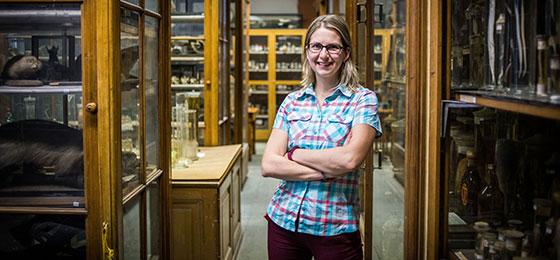New partnerships with Eastern Europe enrich research in Switzerland

The SNSF's PROMYS pilot programme is funding seven promising young researchers in Eastern Europe. This facilitates attractive new partnerships for Swiss research within the European network.
International mobility for researchers is a key driver of scientific progress. Only thanks to cross-border exchanges can small countries, in particular, compete at the cutting edge of numerous research fields at once. Swiss researchers are a case in point – they are more likely to spend time abroad to further their careers than researchers from any other country. At the same time, Switzerland is itself an attractive destination for internationally mobile academics.
"The receiving and the sending countries both benefit from this brain circulation, which also contributes to the transfer of knowledge across national borders," says Marc Zbinden, head of the SNSF's Interdisciplinary and International Cooperation division. For this reason, as well as to help integrate the new member states into the European Research Area, the SNSF launched the pilot programme "Promotion of young scientists in Eastern Europe" (PROMYS) in 2016. Until 2021, it will support seven emerging talents in Eastern Europe, who are conducting ambitious research projects in their home countries and building up their own teams – after working for at least two years in Switzerland. "An important consideration is that these scientists should be able to maintain the contacts and networks established in Switzerland also in the future," says Marc Zbinden.
Research teams off to a flying start
To date, the results have been highly positive, as a look at the individual awardees shows. For example, there's Zuzana Musilová (picture). The evolutionary biologist did her PhD at Charles University in Prague. She then went to the University of Basel, where she investigated how the genome of fishes has evolved over time. Subsequently, she returned to Prague as a PROMYS grantee and continued working there with her own team.
She has since published regularly in leading scientific journals such as "Science" or "BMC Biology". And it is notable that most of her studies have featured international collaboration, particularly with the University of Basel. “My contacts to researchers from all over the world are the most valuable asset I have taken with me," she says. "And now that I have my own research group, we can also contribute to joint projects."
International networking is crucial
Also for immunologist Ondrej Štěpánek, being able to learn from the best and develop ideas with like-minded scientists was the highlight of his stay in Switzerland. His biography bears similarities to that of Zuzana Musilová: doctorate in Prague, research at Basel University and – thanks to PROMYS – his own lab at the Institute of Molecular Genetics of the Czech Academy of Sciences in Prague. He has made a name for himself in the meantime, even winning one of Europe's most prestigious research grants.
"The equipment at our lab in Prague is superb," he says. "But we still need to improve our integration in international networks." Together with his team, he is making every effort to do just that. Researchers from all over the world, including from Switzerland, are contributing to his work to catalogue all T cells in the human body.
Switzerland as partner and object of study
Strong efforts to participate in scientific networks are also under way in Croatia. One of those involved is the political scientist Danijela Dolenec at the University of Zagreb. Thanks to PROMYS, she was able to set up her own research group, which specialises in democracy studies and works closely together with ETH Zurich, where she did her PhD, and the Aarau Center for Democracy.
Her main focus are democratic protest movements in European cities. "In this context, we are particularly interested in the instruments of direct democracy," she says. And adds, laughing: "So Switzerland is at the same time one of our research topics."
Science requires open borders
Only a few hundred metres from Dolenec's institute in Zagreb, Swiss State Secretary for Education, Research and Innovation, Martina Hirayama, took part in an informal meeting of EU science ministers in February 2020. As they talked about "brain circulation", the ministers showed great interest in PROMYS. However, it is not yet clear in what form the SNSF will continue the pilot programme. This will greatly depend on whether the open borders and mobility required by scientists can be maintained in the future.
PROMYS pilot programme of the SNSF